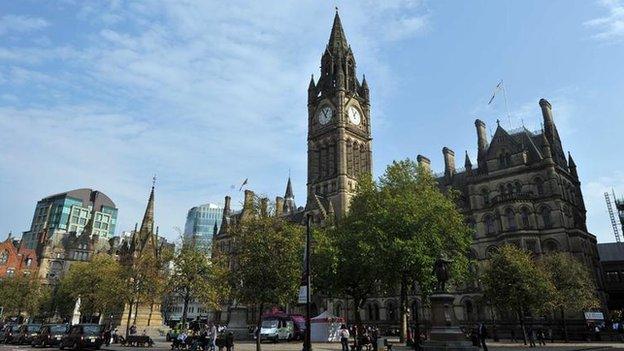Greater Manchester life expectancy has risen since devolution - study
- Published

Devolution saw Greater Manchester take control of more public services
Life expectancy in Greater Manchester has increased since the city region was handed more powers by the government, researchers have found.
The devolution deal saw the region gain more control over a range of services including health and social care.
Manchester University's Philip Britteon said it was "the first robust evidence on the impact of devolution".
Researchers said devolution's benefits were being felt in more deprived areas, suggesting a narrowing of inequality.
Leaders of the 10 councils in Greater Manchester agreed a ground-breaking devolution deal with the government in 2014.
It meant decisions about how to spend budgets would be made locally rather than in Whitehall, with the city region having an elected mayor.
The Health Foundation funded study, published in The Lancet Public Health,, external showed that between 2014-16 and 2017-19:
Life expectancy was 0.2 years higher in Greater Manchester than in comparable areas in England
The change in Greater Manchester was 2.2 times larger than the average for England
Men (0.34 years) saw a significantly larger increase in life expectancy than women (0.06 years)
Statistically significant increases in life expectancy were observed in eight boroughs, with the exceptions being Rochdale (where it fell) and Oldham (where there was no change)
In the short-term, life expectancy remained constant in Greater Manchester but declined in comparable areas in England.
In the longer term, life expectancy increased at a faster rate in Greater Manchester than in the rest of the country
Improvements in life expectancy were larger in areas which had the worst levels of income deprivation and lowest life expectancy prior to devolution
Dr Britteon said: "The study shows modest improvements in life expectancy in Greater Manchester compared to comparable areas in the rest of the country from the introduction of devolution until the start of the Covid-2019 pandemic in 2020.
"This finding may have been driven by a combination of changes in response to the health and social care devolution agreement, the devolution of powers over wider public services, the election of a new mayor, or earlier steps to improve population health prior to devolution.
"The findings support the suggestion that devolved systems are able to more closely identify and address the needs of local populations.
"However, further research is required to understand the mechanisms behind the estimated effect."
Initial data cast some doubt on whether improvements were being made following devolution.
Attendance at A&E units in Greater Manchester, as well as emergency admissions to hospital, increased at a higher rate in the city region than in for England as a whole between 2016-17 and 2018-19.
Speaking in April 2019, Professor of Health Policy and Management at Alliance Manchester Business School Kieran Walshe told BBC North West Tonight: "The answer on most of the metrics is that the jury is still out.
"It's still too soon to see the kind of ambitious promises for improvements in public health outcomes like mortality being delivered."

Why not follow BBC North West on Facebook, external, Twitter, external and Instagram, external? You can also send story ideas to northwest.newsonline@bbc.co.uk
Related topics
- Published1 April 2016

- Published14 May 2015
